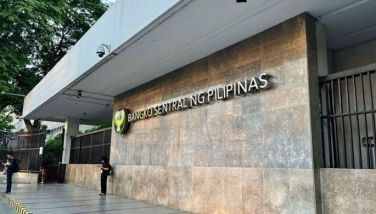BOI pushes anew longer transition, higher GIE rate on tax incentives
MANILA, Philippines — The Board of Investments (BOI) yesterday pushed anew for a longer transition period and the payment of higher tax on gross income earned (GIE) of eight percent under the proposed second package of the government’s tax reform, as it maintained incentives given to investors provide benefits in terms of jobs, greater domestic capacities and revenues.
BOI managing head Ceferino Rodolfo said while the agency supports the planned changes in the incentives regime to make the perks targeted and time-bound, there is a need for government to consider a longer transition period amid concerns raised by firms.
“We are for the tax reform proposal especially in making the incentives time-bound but we have to carefully manage the transition, and not rush the cutting of incentives such as the five percent GIE that we promised to the PEZA (Philippine Economic Zone Authority) locators,” he said.
He said the BOI would want government to consider a five to 10 year range of transition, and to increase the GIE rate to eight percent from the current five percent paid by PEZA - registered firms in lieu of all national and local taxes.
A higher GIE rate of eight percent, he said, could give an immediate additional revenue to the government.
Trade Secretary and BOI chairman Ramon Lopez said increasing the GIE rate to eight percent would allow government to generate up to an additional P40 billion worth of revenues.
Under package 2 of the comprehensive tax reform program, the government seeks to reduce the corporate tax rate and rationalize fiscal incentives given to investors, including removing the GIE incentive.
Rodolfo said exporter-locators have expressed concerns on the planned changes and stated they may expand elsewhere, and even transfer current operations to other countries when the proposal becomes law and takes effect.
“There is a risk and we should minimize all the risks as we need all the jobs we can generate,” he said.
Earlier this week, the Department of Finance (DOF) said government’s foregone revenues were estimated at P1.12 trillion from 2015 to 2017 due to tax incentives and exemptions given to 3,150 companies.
Finance Undersecretary Karl Chua said that while the DOF recognizes the benefits of some incentives given, there is still a need to modernize and improve the incentive system.
“Not all incentives are wasted, not all incentives are bad. Incentives are able to attract investments into the country which would not have come in considering the advantages of other countries in terms of infrastructure, cost efficiencies, labor costs or resource availability. Incentives can help compensate for the disadvantages in locating in our country,” Rodolfo said.
He said investors who enjoy incentives likewise pay tax dues coming from their operations.
“Taxes were paid such as on withholding taxes from salaries, VAT (value-added tax), real estate taxes and the net effect is positive revenue contribution to the government,” he said.
In terms of BOI-registered companies, Rodolfo said there is a 1:4.7 ratio on incentives and revenues to government such that for every P1 incentive, the companies pay around P4.70 for other taxes.
In 2017, BOI incentives availed of amounted to P27 billion, while total taxes paid reached P128 billion.
Based on Tax Incentives Management and Transparency Act data from 2015 to 2017, the top 10 PEZA enterprises paid total taxes of P45.3 billion, while income tax incentives availed amounted to P45.1 billion, leading to a net revenue position of P200 million.
PEZA director general Charito Plaza said companies registered with the agency contributed a total of P10.05 trillion to the economy from 2015 to 2017, with the amount covering investments, exports, salaries and wages, taxes paid, local purchases of capital equipment and raw materials, as well as the agency’s taxes and dividends to the national government.
She said the DOF should not only be concerned on how to increase taxes and income of the national government, but also look at the income created for the local government units (LGUs).
“The operation of PEZA-registered enterprises contributed enormously in uplifting the lives of Filipinos by providing employment, development of private and public lands, the transfer of technology and the social progress experienced by the people and the host LGUs whose poverty and crime incidence are the lowest in the country and contributed the biggest in the country’s GDP (gross domestic product),” she said.
- Latest
- Trending




























